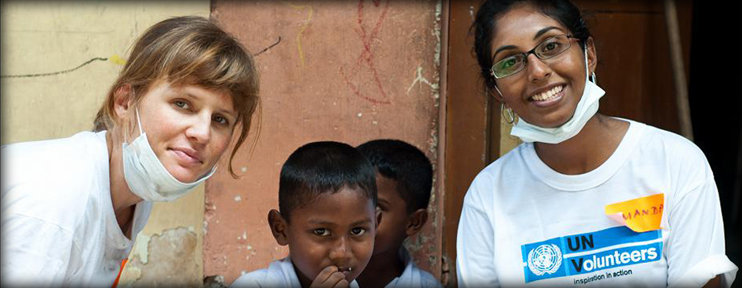On
call for ‘public good’
Top UNV officials explain volunteerism in Sri Lanka
and the world:
by Isuru Kaviratne
 The year 2015 marked an interesting turning point for United Nation
Volunteers (UNV). Not only did they gain greater recognition for their
work and the impact they have in the communities as well as at a
national level, the United Nations General Assembly also passed two
resolutions on volunteers and carried out multiple researches on their
work, attracting the attention of multiple stakeholders. The year 2015 marked an interesting turning point for United Nation
Volunteers (UNV). Not only did they gain greater recognition for their
work and the impact they have in the communities as well as at a
national level, the United Nations General Assembly also passed two
resolutions on volunteers and carried out multiple researches on their
work, attracting the attention of multiple stakeholders.
To discuss the state of volunteerism in Sri Lanka and in the world,
the Sunday Observer sat down with Geoff Prewitt, Chief of Development
Programming Section of the UN Volunteers and Sveva Pettorino, Programme
Officer for UN Volunteers Sri Lanka.
Excerpts:
Q: According to the State of World Volunteerism Report 2015,
last year is considered an interesting year for volunteerism, with
volunteers being considered the agents and pioneers of the peace
building process. Could you outline the work UN Volunteers do around the
world?
Prewitt: I think it’ll be correct to say that volunteers have been
mostly engaged in tasks related to disaster response, which includes
peace and stability. We had some unfortunate incidents last year, such
as Ebola virus and the earthquake in Nepal, where we saw volunteers take
a new sustained momentum because of the immediacy of the response
required.

Sveva Pettorino |

Geoff Prewitt |
|
V-
Awards
Celebrating volunteers in
Sri Lanka, V Awards 2015 was held at Nelum Pokuna Mahinda
Rajapaksa Theatre on Saturday February 13. Sri Lankan
volunteer Kasun Jayatunga won the Volunteer of the Year
award. |
Within the UN Peace Keeping operations globally, UN Volunteers fill
1/3 of the civilian capacities.
Volunteers often get more recognition in the context of peace keeping
and crisis environments, but they make thousands of daily contributions
to public good, not in a reactive way but a proactive way, such as
street cleaning, volunteering in public schools, ensuring that
individuals receive better sanitary conditions, and many other ways.
Q:UN Volunteers accommodate field volunteers as well as online
volunteers and they work under different capacities. Can you explain
this?
Prewitt: UN Volunteers hosts an online volunteer framework, which
matches existing requests for various assignments; these requests can be
as simple as translating a document to as complicated as compiling data
around specific survey questions, or doing a media campaign around
domestic violence or design a website. There different project and
exercises are done online, which then we use as a repository. We have
over 20,000 individuals look through these requests after registering
with us. We had 11,000 assignments done online last year.
The beauty of these online assignments is that you can sit in Brazil
and work on an assignment in Mozambique. Truly inclusive and universal.
On the other hand, as to field volunteers, over one billion people
have volunteered in the world last year. UN Volunteers is a small part
of that, but our mandate is to promote that level of volunteerism. We
placed 6500 standing volunteers in over 120 countries last year. The
majority of them are working with different UN agencies.
Q: With such a large number of volunteers, how do you manage
quality as well as the quantity of volunteers?
Prewitt: As for the quality aspect in the international modality, we
have a roster to which people upload their information against specific
set of credentials, such as academic and career experiences, languages
they speak and so forth. We spend a lot of time reviewing that
information and checking for accuracy. If they pass these stringent
quality criteria, they officially move to our roster. When we receive
requests from UN agencies for possible candidates, we run the profiles
of the vacancy through the database of the International UN Volunteers
and forward CVs of suitable candidates to the relevant agencies. In the
national modality, it’s mostly decentralised to the country
representation, who takes the responsibility of working with the
requesting agency and jointly designing the job description of the
assignment and advertising in local media.
We also have a youth modality and regular modality, because within UN
Volunteers we recognise there is a demographic divide, especially in Sri
Lanka, where inter-generational dialogue is very important.
|
V-
Force
Volunteerism supports
individuals to develop soft skills as well as work specific
skills, in addition to contributing to the development of
the country.
Explaining
volunteerism in Sri Lanka, Sveva Pettorino said there is a
large population of volunteers in Sri Lanka, registered
under V-Force that brings together people who have a passion
for volunteering. The V-Force was started with 10
volunteers, who now number over 5000 supporting various UN
systems under different capacities. The concept of V-Force,
she said, is a unique initiative in Sri Lanka that other
countries look upon as one of the best practices in
organising volunteers. |
Q: One aspect of giving prominence to volunteerism is to
encourage mainstreaming it and give it state level acceptance. How has
the UN Volunteers work been on this front so far and in what countries
has this become a significant success?
Prewitt: This is one area UNV has been active and we use the term
Volunteer Infrastructure to explain it. By deploying Volunteer
Infrastructure, we are setting up a national scheme for volunteering, a
national coordinating body for volunteering or national law for
regulating volunteering. Over 20 countries have such Volunteer Schemes
and there are countries such as Burkina Faso in West Africa that have
successfully implemented it, regulating youth, particularly the
graduated youth, for them to get jobs suitable for their skills.
UNV is an inter-governmental body. We are in countries to help the
host governments and communities. The more we can do to contribute to a
national apparatus that can help sustain and involve volunteers, the
better we are doing our job. Another matter is the power of volunteers
whether it’s political participation, taking on tasks that are otherwise
monetize, their presence makes a difference. In 2014, the number of
volunteer working hours was 1.79% of the GDP of Sri Lanka. The more we
could harness this as positive energy, the more we can use it to develop
Sri Lanka, and the government is fully supportive of the volunteering
efforts.
Sri Lanka has an excellent base of volunteers who are doing great
work and as a country; Sri Lanka has the potential to share their
volunteers with the neighbouring countries as well.
Pettorino: We work with the Ministry of Social Empowerment and
Welfare. We established the Infrastructure, called the National
Volunteering Secretariat, which is now the main entity to match the
demand and supply of volunteers in Sri Lanka, coordinating with the NGOs
and organisations that are in need of volunteers.
We started this as a partnership and now it functions completely
under the Ministry. There is also a policy on volunteerism that has been
drafted, which will be approved soon to leverage more on the importance
of volunteerism in Sri Lanka.
In the context of National Volunteerism Secretariat, we conducted the
first National Conference on Volunteerism last year, with the
participation of volunteers from the UN systems and other NGOs and
volunteers in other organisations, who are engaged in Corporate Service
Responsibility programmes.
The first national survey on volunteerism in Sri Lanka, had a sample
of 15,000 people in all districts, proved that at least 40% of the
people are engaged in volunteering activities in Sri Lanka.
That gave us evidence as to how we can take it to the next level. |

